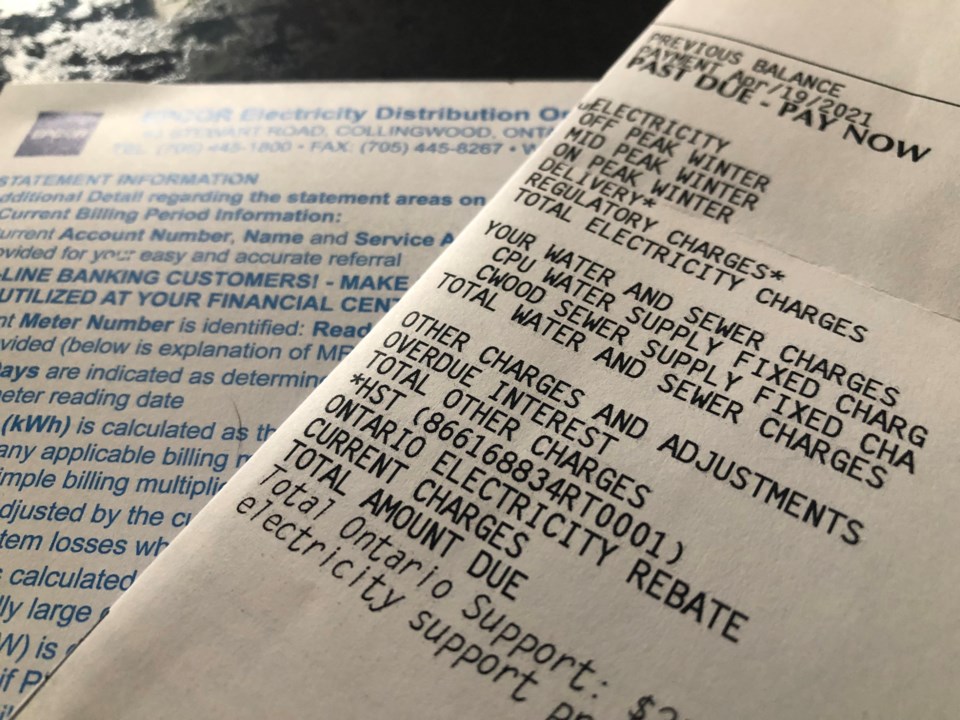Collingwood staff have collected more than $100,000 in overdue water bills over the past four months.
It took more work than expected, though, according to the finance department, so staff are asking council to support a change in the way arrears are handled.
In June, Collingwood Treasurer Monica Quinlan said there was more than $230,000 worth of unpaid water and wastewater bills, which had been escalating since 2017.
On May 25, the arrears were split nearly 50/50 between tenant accounts ($126,400 over 256 accounts) and property owner accounts ($108,700 over 438 accounts).
To collect $70,000 in arrears from homeowner accounts took about five hours of the treasury staff time. The town transferred 48 overdue amounts to the property tax roll.
Homeowners, whether they rent out the property or live there, are responsible for the water and wastewater bill. If unpaid the arrears can be added to the property tax bill.
Staff found collecting from renters was more difficult.
According to financial analyst, Lara Janzen, the process of collecting $40,000 in arrears took about 350 hours of staff time across multiple departments. In that time, 53 overdue accounts were resolved.
In order to recover the arrears, the town issued 54 shut-off notices and shut off water service to one property.
As of Sept. 15, there was $124,000 in water and wastewater arrears still owing to the town, with $86,000 (69 per cent) in overdue bills attached to tenant accounts, and $38,000 linked to homeowner accounts.
“Only about 10 per cent of the town’s water accounts are tenants, but that 10 per cent makes up 70 per cent of the arrears,” said Janzen during the corporate and community services standing committee meeting on Monday, Nov. 1.
Quinlan said collection of arrears, particularly from tenants was difficult for several reasons, one of the main ones being the accumulation of the arrears over time. Creating individual payment plans proved labour-intensive for town staff to continuously follow up with.
“It was really a lot more work than any of us had ever anticipated,” she said. “To be perfectly honest, the build-up was a large part of that.”
While staff has been focused on collecting arrears, they’ve also been working on ways to “do this process better,” Janzen told the committee.
Finance manager, Jennifer Graham, presented three ideas for improving the collection system to avoid the accumulation of arrears in the future.
One option would be to continue on with status quo, but require renters to sign consent forms allowing the town to disclose account balances to property owners. Currently, property owners are not informed when a renter’s account is in arrears until a disconnection notice is issued. The overdue amount, if unpaid gets added to the owners’ tax bill.
Another option presented by staff was to prohibit tenant accounts altogether and require all water and wastewater accounts to be in the property owners’ names.
Graham said staff recommend a third option, which was to stop issuing water shut off notices, and instead to automatically roll arrears that reach $300 or are 90 days overdue into the property tax bill.
According to the finance staff, there are many cases where the town can’t shut off water for a tenant no matter how much the account is overdue because they live in a multi-unit building.
“We will still chase the tenants, but there is a limit to that,” said Quinlan. “The property owners would be aware, in advance, of amounts accumulating.”
The staff recommended option would also require both the tenant and the owner to be listed on the account as primary and secondary account holders. Both would receive overdue notices, and both could access the account balance at any time.
Mayor Brian Saunderson said he thought the change would go a long way to resolve the concerns brought forward to council from landlords.
“It will help make sure these things get addressed before the stakes are too high,” said Saunderson.
Councillor Mariane McLeod, chair of the corporate and community services committee, asked what tools would be left for landlords to collect overdue bills if the town was no longer issuing shut-off notices.
Treasurer Quinlan said in many cases the town wasn’t able to turn off the water anyway, and though landlords knew they were responsible for the arrears, they didn’t know how much had accumulated.
The committee supported staff’s recommendation to stop issuing shut-off notices, require tenants to sign consent forms allowing the account balance to be shared with the property owner, and automatically adding arrears that are 90 days overdue, or amount to $300, to the property tax bill.
The decision will have to be finalized with a council vote at a future council meeting.
